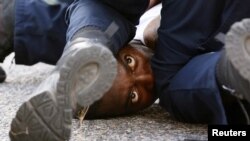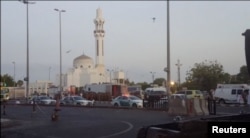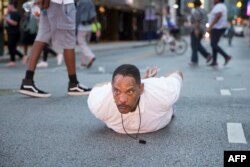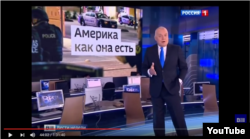The shooting deaths of five officers at a Dallas protest against the police killings of black men has made international headlines this week.
In social and traditional media outlets, the violence has focused the world's attention on two big issues: race discrimination and gun control.
Many commentators view the incidents of the past week as evidence that racial bias is all-pervasive in the United States. Others view them through the lens of sectarian or civil strife in their own countries. And some of the harshest critics hail from countries whose own rights records are questionable.
Translation of above tweet by Hindi APB News: The person shooting in Dallas was an army reservist who had been posted in Afghanistan.
"The era of racial hatred between blacks and whites in the United States has not ended yet. The whites have not yet changed the mindset of racial supremacy, said New Delhi's Hindustan Express in Urdu Tuesday
"Will Barack Obama bequeath to his successor an America set on fire?" asked France's Le Figaro newspaper Monday. "The tensions pervading the country run so deep that they offer potential ammunition for a civil war. Ever-growing inequalities; some 300 million firearms in circulation; ultra-violent gangs, and police methods whose brutality is unparalleled in any democracy..."
Translation: Police in the United States. The sign reads "don't shoot" and below, "shoot."
Commentators noted the irony that racial tensions should be escalating after America's first black president finishes a second term in the White House:
"Even the election of Barack Obama – twice – failed to act as a milestone to bring about a sea change," wrote Greek journalist and author Pantelis Boukalas for the Athens daily I Kathimerini's online English edition Tuesday. "Proof lies in the killings of unarmed African-Americans by police that appear to continue unabated and, in most cases, without any serious consequences for the offending officers."
Saudi Arabia has been engrossed in Ramadan, Eid al-Fitr celebrations and its own "terrorist blasts," said Saudi journalist and commentator Tariq A. Al-Maeena.
That isn't to say the Dallas shooting and recent police shootings have gone unnoticed, he continued, and the most common response he has heard has been, "Here we go again."
"Many feel that the adventurism of George W. Bush and his wars has led to a trigger-happy community. Others feel the quick access to weapons has made Americans unwilling to repress their biases and that they are resorting to settle their disputes with the gun. Tragically, this has led to a war between themselves along race lines."
Al Maeena believes that the election of Barack Obama to the White House has "tugged at the nerve of some white Americans" and that neither the president nor the U.S. Congress have succeeded in limiting access to guns.
Translation of above tweet by UAE University political science professor Abdel Khaleq Abdullah Abdel Rahman (above): After the exposure of an Emirati citizen to arbitrary treatment in Ohio and after the events of the city of Dallas, I would prefer to stay away from the police in America. They are tense and unsafe and very racist.
Abdullah refers to a June 29 incident in which an Emirati businessman undergoing medical treatment at the Cleveland Clinic in Ohio was swarmed by police, handcuffed and forced to the ground by armed police – this after a panicked call from a hotel clerk's family members, who believed he was an Islamic State terrorist.
The UAE and the Bahamas issued warnings to citizens about travel to the U.S.
So, too, did Bahrain, whom Human Rights Watch and other watchdog groups have accused of police brutality, arbitrary detention and torture in its handling of protests.
"For some, the Dallas shooting was nothing more than a proof of the total collapse of the social fabric of the American society," said Bahrain political analyst and writer Abdullah Al-Junaid.
"Yes, the U.S. needs to re-address its understanding of security and terrorism," Junaid continued. "They also they need to demilitarize the role of the police force, and re-engage the local society. At the same time, they must re-read the founding fathers' principles of bearing arms. Because the gun culture is a fast lane with a dead end."
But he expressed confidence in Americans' "tenacity and resilience."
Across the Gulf in Iran, whose government came to power via revolution, some observers viewed Dallas in terms of a pending racial revolution:
"Now, it is clear that, during the recent events in Dallas, one of the assailants deliberately targeted only white police officers," Amirali Abolfat'h commented Tuesday in Etemaad, a reformist Iranian newspaper. "This shows that American blacks are trying to organize armed resistance and protests using what is allowed by law, such as the ability of carrying firearms. It is expected that such bloody events will happen again unless the U.S. judicial and police systems reform the way they interact with underprivileged groups."
Zimbabwe’s The Herald Online in English noted that the Dallas shootings and the spate of police shootings in the U.S. have "left questions as to why it is deemed to be unusual when police in Zimbabwe take appropriate measures to contain violence."
Zimbabwe this week is coping with a similar scandal after video was released showing police beating women and children during protests against President Robert Mugabe.
Elsewhere on the African continent, a Monday editorial in Nigeria's Vanguard newspaper noted, "America is all too familiar with armed violence. ... Each new shooting is born from a cocktail of toxic political issues that have pitted Americans against each other.They have brought a measure of common revulsion, but not a common purpose."
Read more at: http://www.vanguardngr.com/2016/07/obama-faces-late-test-leadership-dallas/
Across the globe in China, the state newspaper Global Times issued a scathing editorial which was translated and quoted by the Hong Kong Free Press online:
“And the U.S. still has the mood and energy to disrupt law and order in China – the West is so self-satisfied, it makes one marvel."
This Twitter user from Shanghai, however, was less interested in the news from Dallas than in the technology used to bring down the sniper:
On Russian TV Rossiya, Dmitry Kiselyov, during his weekly news review program Vesti Nedeli, stated that U.S. officials defend American police despite the fact that they have been killing blacks, "one after another, for nothing."
Kiselyov accused the U.S. of seeking to impose its ideals on countries whose natural resources it wants to control, and concluded that while Russian police are "not always ideal," they behave much better than their American counterparts.
His comments came just weeks after an incident in which a Moscow police officer wrestled a U.S. diplomat to the ground in front of the American Embassy in the Russian capital. London's Guardian newspaper quotes a Russian foreign ministry spokesperson as saying the diplomat, whom she insisted was a CIA operative, had struck at the officer first.








